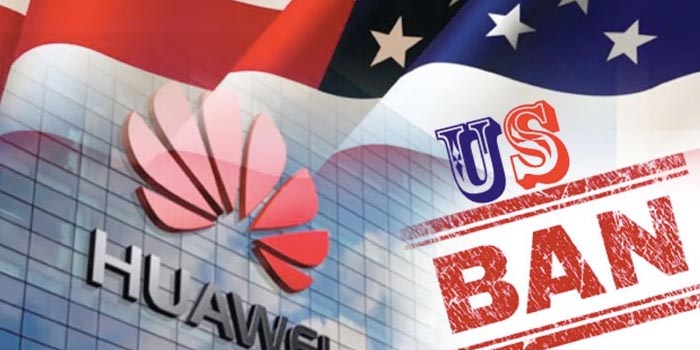Search result

Yesterday US President Donald Trump made an announcement that comes as a great surprise to Huawei users. At the ongoing G20 summit Trump said that "U.S. companies can sell their equipment to Huawei." This is a major relief to Huawei, which was suffering from the political tension between the USA and China. He further added, "We are talking about equipment where there's no great national security problem with it. I said that's O.K., that we will keep selling that product, these are American companies that make these products. That's very complex, by the way. I've agreed to allow them to continue to sell that product so that American companies will continue."
Somehow the President of the USA and China agreed to continue the trade between the two countries. As negotiations are expected to resume on this matter, Trump says he will allow Huawei to do business with US-based companies. The relief isn't going to remove the ban on the Huawei immediately but hopefully, both parties will conduct conversations on how to remove the company's presence on the entity list soon. Mr. Trump didn't get into any particular details regarding the scope of relief, so we have to wait for the further announcement.
Nonetheless, this news comes as a major relief for the company and its stakeholders. After Trump banned the company from buying and using any services or products from US-based companies including Google, Qualcomm, and many other suspended business with Huawei. It was granted a temporary general license for a few months to prepare for the permanent ban. Because of this ban, the future of the Chinese company was in the dark. The company's sale dropped as much as 40 percent as a result of the ban. With this relief, we can expect Huawei to resume the usual operation.

As a final blow, the Trump administration revoked dozens of licenses from Huawei suppliers, including chipmaker Intel. The action taken by Donal Trump is his last effort to weaken the world's largest telecommunication company, which they termed as a matter of national security. According to Reuters, the Semiconductor Industry Association said on Friday that the Commerce Department had issued "intents to deny a significant number of license requests for exports to Huawei and a revocation of at least one previously issued license." Some licenses were apparently under review status for many months and are now being denied just a few days before President Trump has to leave the office.
Earlier, almost 150 licenses were said to be in the review status for $120 billion worth of products and technology. Of these, a vast majority of licenses have been reported to be denied, while the eight other licenses were revoked to maintain consistency with the licensing rules. A source confirmed that another $280 billion worth of licenses for Huawei hasn't been processed yet. Huawei suppliers have already been notified of the license cancellation. They have 20 days to respond to the decision. The Department of Commerce has 45 days to issue any changes to the decision, or it becomes the final decision. Companies will have another 45 days to appeal against the final decision.
Meanwhile, Huawei has restarted its efforts to rejuvenate the supply. According to a recent Nikkei Asia report, the company is trying to find more investors to bring in some cash and move forward against all the odds. In fact, the device manufacturer has already acquired stakes in 20 semiconductor suppliers to cover the gap. Huawei has been under fire from the Trump administration since May 2019 and today's action will put the company more in heap.

Apple iPhone is one of the most expensive smartphones and now it is going to even pricier. Thanks to Trump administration who is threating to impose more tarrif on Chinese products, iPhone prices could go up to 14%, according to CNBC. This would make the cheapest iPhone XR $750 to cost us an extra $100. Whereas the most expensive one the iPhone XS max would cost $200 more - bringing its price tag up to $1,650. J.P Morgan said, "We estimate a price increase of around 14% is required to absorb the impact of a 25% tariff, keeping margin dollars for all players in the supply chain constant," J.P. Morgan said in a note to clients Tuesday.
With $200 billion on hand, Apple can easily afford this cost but most likely it is going to past down to the customer. The tarrif isn't a reality yet but on Monday, Trump tweeted that customers in U.S should buy stuff from other countries or something made in U.S. This is easy to say but in practical terms may be not easy to do. Apple has clearly stated that it iPhones may not get have a huge impact from this trade war but the prices of other products like Apple watches and Air Pods are going to be higher with immediate effect if the tarrif is imposed.
According to statista.com, throughout 2010, 304.7 million devices were shipped. In 2018, we see that 1.4 billion units were sold, which is way higher figure anyone would have anticipated a decade ago. It seems that market is already saturated with dozens of smartphone manufacturers already. Looking in the future, some people suggest that Apple may move its production unit to some other Asian country or should move to U.S completely. Bank of America Merrill Lynch estimates that iPhone prices would have to increase by around 20 percent if production was moved to the U.S. "We estimate the incremental cost of manufacturing iPhones in the U.S. could be 15-25%, and, if passed on to consumers could lead to demand destruction, in our view," the Bank of America said in a note.

The increase in the sale of smartphones has also increased the use and popularity of mobile apps. People are spending their time pursuing their favorite hobbies and passions, and many are even winning big.
The blacklist prepared by the Trump administration raised concerns over the future of Chinese smartphone companies like Huawei. But Trump seems to have retraced his steps in the G20 summit and provide a sigh of relief to Chinese manufacturers. Interestingly, Huawei is already looking forward to a bright future, with record sales that can even overtake Samsung in the coming years.
But why did Trump blacklist Huawei in the first place? And how does Huawei plan to take advantage of the backtrack?
Before we go into the details, let's first take a brief look at Trump's move.
The Blacklisting of Huawei
The US Commerce Department decided to add Huawei to an entity list in May 2019. The move disallowed the Chinese company to purchase components like microprocessors from American companies. The allegation against Huawei was that the company helped Beijing in espionage attempts and posed a security threat to the country. Huawei, on its part, has always denied the allegations.
Consequently, Huawei got a breather when President Donald Trump met his Chinese counterpart, Xi Jinping at the G20 Summit in Japan in June. The presidents had a talk that obviously involved Huawei, and on June 29, Trump told reporters that US companies are allowed to sell components to Huawei. He also added that the move implies that there was no significant security threat from Huawei to the nation.
Huawei Welcomes the Move
Like mobile betting on a sports event, Huawei appears to have placed their "mobile bets" already, being quick to welcome the move and took to Twitter to express their happiness. The company described the move as a "U-turn" and revealed that they are again allowed to purchase American technology.
The move by Trump to lift the ban seems to have been fueled by deep concerns over losing US business. A lot of American companies supply components to the Chinese giant and the blacklisting could have resulted in losses of billions of dollars.
Huawei would also have scrapped American companies from its supply chain, something not very beneficial to the US economy. Trump said that he would allow American companies to sell products to Huawei even though it may surprise many people.
Huawei Looks Forward to a Bright Future
Huawei had already been posting an impressive profit and sales figures before the blacklist was announced. The company recorded a 40% year-to-year increase in revenue in the first quarter of 2019, amounting to US$27 billion. In the face of the blacklist, Huawei tuned down their forecast and announced cutting smartphone shipments by around 30%.
After the backtracking from Trump, Huawei now plans to sell more than 260 million units of smartphones in 2019, overtaking their earlier forecast of 250 million units. Huawei already holds 50% market share in China and sells its products in numerous countries. In fact, if things go according to the forecast, Huawei may overtake Samsung as the top global manufacturer by 2020.
Do you think Huawei will be able to beat Samsung as the number one smartphone company? Leave your opinions in the comments!
© 2023 YouMobile Inc. All rights reserved





